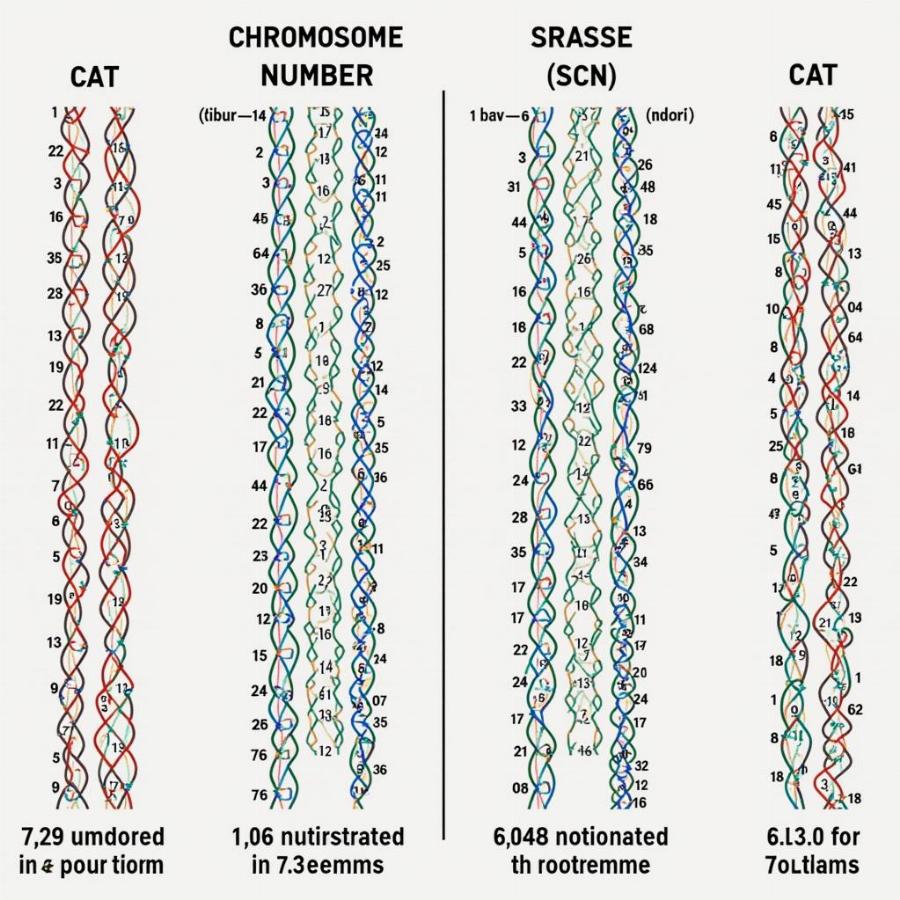Can dogs and cats mate? This is a question that often sparks curiosity, especially among pet owners. While the idea of a dog-cat hybrid might seem intriguing, the biological reality is more complex. The short answer is no, dogs and cats cannot successfully mate and produce offspring. Let’s delve into the scientific reasons why this interspecies pairing doesn’t work and address some common misconceptions surrounding this topic.
Understanding the Biological Barriers Between Dogs and Cats
The inability of dogs and cats to mate successfully stems from fundamental differences in their genetic makeup, reproductive systems, and mating behaviors. These differences act as insurmountable barriers to interspecies breeding.
Genetic Incompatibility: A Key Factor
Dogs and cats belong to different species, Canis familiaris and Felis catus, respectively. This means they possess distinct numbers of chromosomes, the structures that carry genetic information. Dogs have 78 chromosomes, while cats have only 38. This chromosomal disparity makes it impossible for their genetic material to combine and create viable offspring. Think of it like trying to fit puzzle pieces from two entirely different puzzles together – they simply won’t match.
Reproductive System Differences: Further Obstacles
Beyond genetics, the reproductive systems of dogs and cats are also incompatible. Their reproductive cycles, mating behaviors, and gestation periods differ significantly. These variations further complicate the possibility of successful interspecies breeding. For instance, dogs have a longer gestation period of around 63 days, while cats gestate for approximately 65 days.
Behavioral Mismatches: Adding to the Complexity
Even if dogs and cats could overcome the genetic and reproductive hurdles, their vastly different mating behaviors would likely prevent successful breeding. Dogs and cats communicate and display courtship behaviors in completely different ways. These behavioral mismatches would make it challenging for them to understand each other’s signals and initiate mating.
 Dog and Cat Chromosome Comparison
Dog and Cat Chromosome Comparison
Debunking the Myth of Dog-Cat Hybrids
The idea of a dog-cat hybrid, often jokingly referred to as a “cat-dog” or “dog-cat,” is a popular misconception. While the internet is filled with anecdotal stories and fabricated images of such creatures, there is no scientific evidence to support their existence. The biological barriers discussed earlier make the creation of a true dog-cat hybrid impossible.
Can a Dog and a Cat Mate? Addressing the Confusion
While actual mating between a dog and a cat might occur, it’s crucial to understand that mating does not equate to successful reproduction. Due to the biological incompatibilities, fertilization and the development of a viable embryo are not possible.
“The fundamental genetic differences between dogs and cats are so profound that successful interspecies breeding is simply not possible,” says Dr. Emily Carter, a renowned veterinary geneticist. “The idea of a dog-cat hybrid is purely fictional.”
What if My Dog is Showing Interest in My Cat?
Sometimes, dogs and cats can display unusual interest in each other, which might be misinterpreted as mating behavior. This interest could stem from playfulness, curiosity, or even predatory instincts in some cases. It’s essential to understand the underlying reasons for these interactions and ensure the safety and well-being of both pets.
Understanding Inter-species Interactions
If you observe your dog exhibiting excessive interest in your cat, especially if it involves mounting or other potentially harmful behaviors, it’s important to intervene and redirect their attention. Provide separate spaces for your pets when necessary and consult with a veterinarian or animal behaviorist for guidance on managing their interactions. For more insights on this topic, you can explore our article on cats and dogs mate.
Conclusion: Separating Fact from Fiction
So, can a dog and a cat mate? While physical interaction might occur, successful reproduction is biologically impossible. Understanding the genetic, reproductive, and behavioral differences between these two species helps dispel the myth of dog-cat hybrids. Remember, responsible pet ownership involves understanding the unique needs of each species and providing a safe and harmonious environment for all your furry companions. If you are concerned about your pets’ interactions, learn more about dog mating with cat.
FAQ: Common Questions About Dog and Cat Mating
- Can a dog impregnate a cat? No, a dog cannot impregnate a cat due to their genetic incompatibility.
- Can a cat impregnate a dog? No, a cat cannot impregnate a dog for the same reasons.
- Has there ever been a documented case of a dog-cat hybrid? No, there is no scientific evidence of a dog-cat hybrid.
- Why does my dog try to mount my cat? This behavior could be due to playfulness, dominance, or even sexual frustration, but it does not mean they can successfully mate. You can read more on dog mates cat.
- What should I do if my dog and cat don’t get along? Consult with a veterinarian or animal behaviorist for guidance on managing their interactions. You can also find helpful tips in our article on can a dog and a cat mate.
- Is it safe to let my dog and cat play together unsupervised? It’s generally recommended to supervise interactions, especially if there’s a history of conflict or aggressive behavior.
- Can dogs and cats form close bonds? Absolutely! Many dogs and cats can develop strong, loving relationships, even if they don’t always understand each other’s behaviors perfectly.
Beaut Dogs is your trusted source for all things related to dog breeds, care, and well-being. We provide expert advice and valuable resources to help you navigate the wonderful world of dog ownership. When you need support, please email us at [email protected] for detailed and accurate answers. Visit us at https://beautdogs.com to learn more!